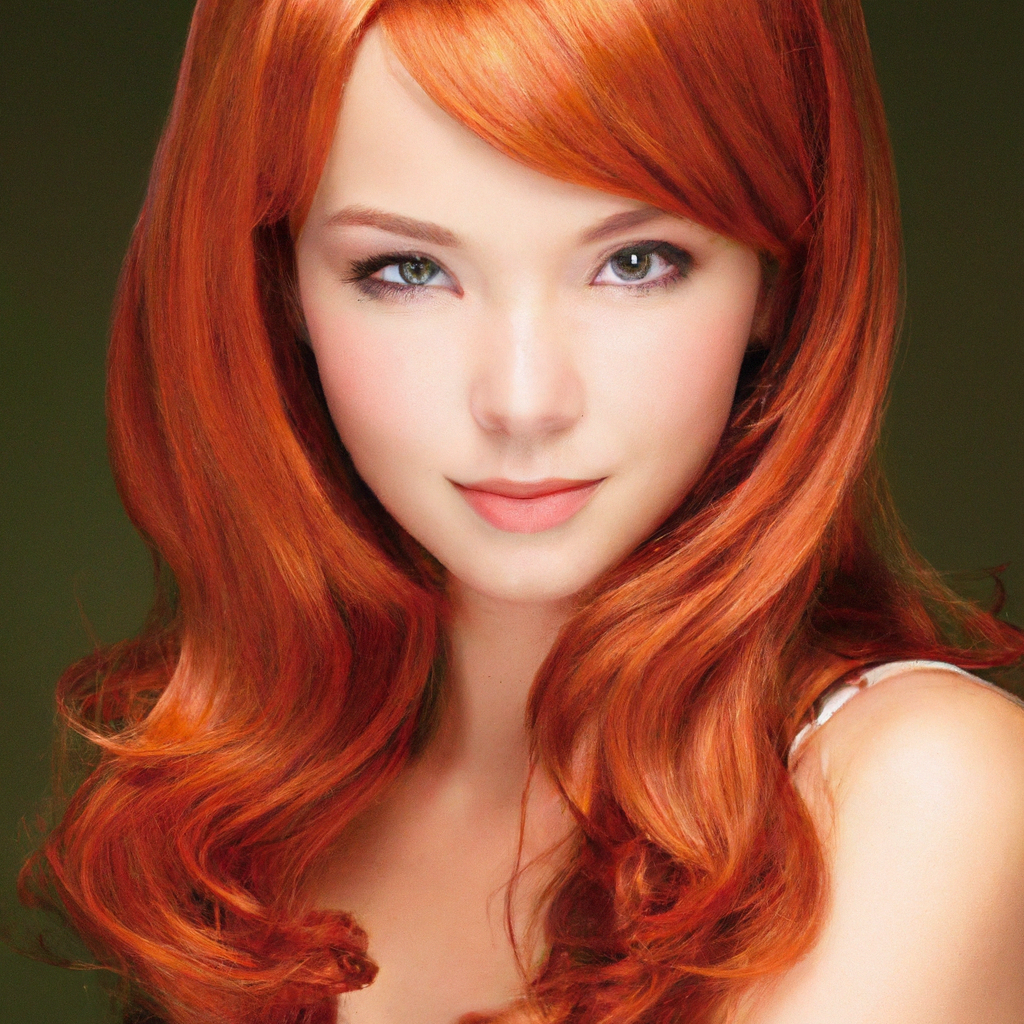Imagine finding the perfect wig to complete your look, only to realize that it irritates your sensitive ears. It’s a frustrating situation that many individuals with this condition can relate to. However, there may be a solution – ginger wigs. Yes, you read that right. This article explores the surprising suitability of ginger wigs for those with sensitive ears, delving into the reasons behind their potential comfort and exploring how they can provide a stylish alternative for those in search of relief.

What are ginger wigs and their characteristics?
Definition of ginger wigs
Ginger wigs are wigs that are specifically designed to mimic the appearance of natural ginger-colored hair. These wigs are available in various shades of red, ranging from bright copper to deep auburn tones. Ginger wigs can be made from both synthetic and natural hair, depending on personal preference and budget.
Common features of ginger wigs
Ginger wigs share many common features with other types of wigs. They are typically designed with a wig cap that fits securely on the head and mimics the appearance of a natural scalp. This cap is where the ginger hair strands are attached, either individually or in wefts. Ginger wigs can be styled in various ways, including straight, wavy, or curly, to suit different preferences and occasions.
Different types of ginger wigs available
There are various types of ginger wigs available on the market to cater to different needs and preferences. Some popular options include lace front wigs, which have a sheer lace panel at the front that creates a natural-looking hairline. Full lace wigs, on the other hand, have a lace cap that covers the entire head, allowing for versatile parting and styling options. Additionally, there are ginger wigs with different hair lengths, densities, and cap constructions, providing a wide range of choices for individuals with diverse preferences.
Understanding sensitive ears
Definition of sensitive ears
Sensitive ears refer to a condition whereby the ears are prone to irritation, discomfort, or pain due to various external or internal factors. This sensitivity can manifest as a reaction to certain materials, pressure, or even changes in temperature or humidity. Individuals with sensitive ears may experience itching, redness, swelling, or a general feeling of discomfort in and around their ears.
Common causes of sensitivity in the ears
There are several common causes of sensitivity in the ears. Allergies to certain metals, fabrics, or hair products can trigger an allergic reaction in the ear area, leading to discomfort and irritation. Additionally, individuals who have a history of eczema or dermatitis may be more prone to ear sensitivity. Other potential causes include improper ear care practices, excessive ear cleaning, or even certain medical conditions.
Impact of sensitivity on daily life
For individuals with sensitive ears, their condition can significantly impact their daily life. Wearing certain types of jewelry, headphones, or even hats can cause discomfort and irritation. This can make it challenging to enjoy activities such as listening to music, wearing fashionable accessories, or participating in sports that require headgear. Furthermore, individuals with sensitivity in the ears may find it difficult to wear wigs or other hair accessories without experiencing discomfort or worsening their symptoms.
Factors to consider when selecting a wig
Material used for the wig
When selecting a wig, it is essential to consider the material used for its construction. Synthetic wigs are typically made from polyester, acrylic, or other synthetic fibers, while natural hair wigs are made from real human hair. Each material has its advantages and considerations. Synthetic wigs are generally more affordable, low-maintenance, and resistant to humidity. However, some individuals with sensitive ears may be allergic to certain synthetic fibers, which could further irritate their condition. Natural hair wigs, although pricier, tend to provide a more realistic look and feel and may be preferable for those with highly sensitive ears.
Weight and size of the wig
The weight and size of the wig are crucial factors to consider when selecting a wig for individuals with sensitive ears. A heavy wig can put additional pressure on the ears, potentially exacerbating any discomfort or irritation. Opting for a lighter wig can help alleviate this issue. Similarly, ensuring that the wig fits properly and is neither too tight nor too loose is essential for minimizing any potential discomfort.
Manufacturing techniques and quality
The manufacturing techniques and overall quality of the wig also play a significant role in determining its suitability for individuals with sensitive ears. High-quality wigs are often constructed using meticulous techniques that minimize the risk of irritants or allergens being present in the wig materials. Investing in a well-made wig can help reduce the chances of experiencing any adverse reactions or discomfort.
Types of wig caps and their impact on sensitivity
The type of wig cap used can greatly impact the comfort and suitability of a wig for individuals with sensitive ears. Some wig caps, such as monofilament caps, feature a thin, breathable material that mimics the appearance of a natural scalp. These caps allow for enhanced ventilation, reducing the potential for irritation or discomfort. Additionally, wig caps with adjustable straps or clips can provide a customized fit, reducing pressure on the ears and enhancing overall comfort.
Breathability and ventilation of the wig
Proper breathability and ventilation are essential for individuals with sensitive ears. Wigs that are made with breathable materials and designed to allow air circulation can help prevent excessive sweating and moisture build-up, reducing the risk of irritation or infection. Look for wigs with features such as open wefting or lace caps that promote airflow and cooling.
Hair density and its effect on ear irritation
Hair density refers to the thickness or volume of the wig. When selecting a wig for sensitive ears, it is advisable to choose a wig with a moderate hair density. A wig that is too thick or heavy can put unnecessary pressure on the ears, potentially leading to discomfort. On the other hand, a wig with insufficient hair density may feel less secure on the head, requiring more adjustments and potentially causing irritation.
Benefits of ginger wigs for individuals with sensitive ears
Hair length and coverage
Ginger wigs offer the benefit of versatile hair length and coverage options. For individuals with sensitive ears, opting for a ginger wig with shorter hair length can minimize contact with the ears, reducing the chances of irritation or discomfort. Similarly, choosing a wig with ample coverage can help protect the ears from external elements and enhance overall comfort.
Softness and natural feel of ginger wigs
Ginger wigs, particularly those made with high-quality natural hair, provide a soft and natural feel that closely resembles real hair. The softness of the hair strands can be soothing for those with sensitive ears, minimizing any potential irritation or discomfort.
Lightweight nature of ginger wigs
Ginger wigs are often designed to be lightweight, making them a suitable option for individuals with sensitive ears. The lighter weight helps to minimize pressure on the ears, reducing the risk of discomfort and irritation, even during extended wear.
Wig caps with sensitive ear-friendly designs
Some ginger wigs are specifically designed with sensitive ears in mind. These wigs may feature wig caps that have extra padding or cushioning around the ear area to provide additional comfort and minimize any potential irritation or pressure.
Ventilation and breathability of ginger wigs
Like other wigs, ginger wigs can be constructed with features that enhance ventilation and breathability. This can help reduce the likelihood of sweating or moisture build-up around the ears, which can often lead to discomfort or irritation.

Potential drawbacks of ginger wigs for individuals with sensitive ears
Potential irritants or allergens in the wig materials
While ginger wigs can offer many benefits for individuals with sensitive ears, there is still a possibility that some individuals may be allergic to certain materials used in the construction of the wig. It is essential to carefully read the product descriptions, check for any potential allergens, and perform patch tests if necessary before wearing a ginger wig for an extended period.
Limited availability of ginger wigs in sensitive ear-friendly styles
Although ginger wigs are available in various styles and types, the range of options specifically designed for individuals with sensitive ears may be limited. Finding a ginger wig with all the desired features, such as a sensitive ear-friendly cap design or proper ventilation, may require more thorough research or consultation with a wig specialist.
Maintenance and care requirements of ginger wigs
Ginger wigs, like all wigs, require regular maintenance and care to ensure their longevity and hygiene. For individuals with sensitive ears, this may necessitate additional caution and attention to avoid any unnecessary discomfort during the cleaning, styling, or maintenance process. It is crucial to follow the manufacturer’s instructions or seek guidance from a professional to ensure proper care.
Tips for wearing ginger wigs comfortably with sensitive ears
Choosing a proper wig cap
When wearing a ginger wig with sensitive ears, selecting a wig cap that is designed to be comfortable is crucial. Look for wig caps that have padding or cushioning around the ear area to minimize any potential discomfort or irritation. Additionally, opting for wig caps with adjustable straps or clips can help achieve a customized fit that reduces pressure on the ears.
Using protective barriers like silicone pads
To further enhance comfort while wearing ginger wigs, some individuals may choose to use protective barriers like silicone pads. These pads can be placed between the wig and the ears, providing an additional layer of cushioning and reducing friction or pressure on the sensitive skin.
Adjusting the wig to minimize pressure on the ears
Properly adjusting the wig is essential for minimizing pressure on the ears. Ensuring that the wig is not too tight or too loose can help prevent unnecessary discomfort. Make necessary adjustments in the wig straps or clips to achieve a secure yet comfortable fit.
Using hypoallergenic adhesives or tapes
For individuals who prefer additional security and stability when wearing ginger wigs, using hypoallergenic adhesives or tapes can help keep the wig in place without causing any adverse reactions or irritation. Opt for products specifically designed for sensitive skin to minimize the risk of any unwanted side effects.
Maintaining cleanliness of the wig
Regularly cleaning and maintaining the wig is crucial for avoiding any potential discomfort or irritation. Follow the manufacturer’s instructions for cleaning and care routines, and ensure that the wig is kept in a clean and hygienic state. Paying attention to maintaining cleanliness can help prevent any build-up of sweat, oil, or other substances that could lead to ear irritation or discomfort.
Precautions and considerations for individuals with sensitive ears
Consulting with a dermatologist or allergist
If you have sensitive ears, it is advisable to consult with a dermatologist or allergist to better understand your specific condition and determine any potential allergens or triggers. They can provide personalized advice and recommendations for selecting wigs, materials, or cleaning routines that are less likely to cause irritation or discomfort.
Performing patch tests for allergic reactions
To identify any potential allergies or sensitivities to wig materials, perform patch tests before wearing the wig for an extended period. Apply a small amount of the wig material to a small area of skin, preferably behind the ear, and monitor for any adverse reactions. If redness, itching, or other symptoms develop, avoid using that specific wig or material.
Being aware of personal triggers for ear sensitivity
It is essential to be aware of personal triggers for ear sensitivity. Some individuals may have specific allergies or sensitivities to certain materials, fabrics, or hair products. By identifying these triggers, individuals can make more informed choices when selecting wigs and take precautions to avoid any potential discomfort or irritation.
Regular ear care and cleaning routines
Maintaining proper ear care and cleaning routines is crucial for individuals with sensitive ears. Avoid using harsh or irritating substances when cleaning the ears and follow the recommendations of healthcare professionals for maintaining ear health. By keeping the ears clean and healthy, the risk of irritation or discomfort when wearing wigs can be minimized.
Case studies and testimonials
Experiences of individuals with sensitive ears wearing ginger wigs
Several individuals with sensitive ears have reported positive experiences wearing ginger wigs. They have mentioned that the softness and lightweight nature of ginger wigs have helped alleviate any potential discomfort or irritation. Some individuals have specifically highlighted the wig caps with sensitive ear-friendly designs and the breathability of ginger wigs as significant factors contributing to their overall comfort.
Effectiveness of ginger wigs in reducing ear discomfort
Reports from individuals with sensitive ears wearing ginger wigs indicate that these wigs can be effective in reducing ear discomfort. The proper choice of materials, wig caps, and overall design of ginger wigs have provided a more comfortable and irritation-free experience for these individuals. However, it is important to note that individual experiences may vary, and it is advisable to consult with a wig specialist or healthcare professional for personalized advice.
Recommendations provided by wig specialists
Wig specialists often recommend ginger wigs for individuals with sensitive ears due to their softness, lightweight nature, and availability of sensitive ear-friendly designs. They emphasize the importance of choosing high-quality wigs, following proper maintenance routines, and considering individual preferences and sensitivities. Seeking guidance from a wig specialist can help ensure a more personalized and suitable wig selection for individuals with sensitive ears.
Conclusion
Ginger wigs can be a suitable option for individuals with sensitive ears, providing a range of benefits such as hair length and coverage options, softness, lightweight design, and sensitivity-friendly features. However, it is crucial to consider factors such as the wig material, size, manufacturing techniques, wig cap design, breathability, and hair density when selecting a wig. While there may be potential drawbacks, such as allergens or limited availability, following tips for comfortable wear, and taking necessary precautions can help individuals with sensitive ears enjoy the benefits of ginger wigs. Consulting with professionals and maintaining regular ear care routines are essential for ensuring overall ear health. The wig industry continues to evolve, and future advancements may further enhance the suitability of ginger wigs for individuals with sensitive ears. Ultimately, it is important to prioritize personal preferences and seek professional advice to find the most suitable ginger wig for individual needs.
